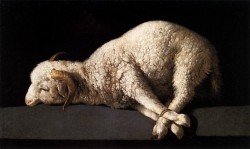
You probably haven’t yet heard the new translation of the Mass, but I’ll bet you’ve heard plenty about it. The media interest has been astonishing. The Church’s education efforts have been prodigious. The response from Catholic publishers has been just short of epic.
Thanks be to God for this historic moment that returns our focus to the Mass. I know that it will be a difficult adjustment for some, both priests and lay people. I’ve been attending daily Mass for a couple decades and more, and so I’ve burned deep neural pathways for all the accustomed responses. I’ll be stumbling over myself in the coming weeks. I’ll be paging through the missal to find new texts for prayers that I could, just weeks ago, recite automatically, without thinking.
And that, too, is a grace! Weeks ago I had the dubious luxury of not thinking at Mass, of letting my mind wander. Now I need to think about what I’m saying and doing. This will feel awkward, but the awkwardness itself will rouse me to my senses. I’ll be looking at the same old ritual, but as if I’m seeing and praying it for the first time. What a great return for a little bit of sacrifice.
Then, as I pray, the translation itself will take me deeper into the mysteries of Jesus Christ. The new translation aims for a more precise, literal rendering of the prayers as they appear in the original Latin and in the biblical languages. I spoke recently with a Latinist who has studied the translation closely, and he said he was overwhelmed by how many biblical quotations and allusions have now come to the fore. He began counting — and he stopped in the nine hundreds!
Let’s look at just one example, from a certain climactic moment in the Mass.
It comes just before we go forward for Holy Communion. The priest at the altar genuflects, takes the host and, holding it aloft, says: “Behold the Lamb of God, behold him who takes away the sins of the world. Blessed are those called to the supper of the Lamb.”
Again, you don’t need to be a biblical scholar to recognize this line. If you’ve read my book The Lamb’s Supper, you know of my fondness for Revelation 19:9. There, it’s an angel who says: “Blessed are those who have been called to the wedding feast of the Lamb.” I built a book around that summons because I believe it conveys something essential to Christian life. It proclaims our beatitude. We’re not just happy when we attend the liturgy; we’re blessed. We go to heaven when we go to Mass.
There’s a world of difference between this response and the old rendering: “Happy are they who are called to his supper.” The old version suggests dinner time, and so it is. But the new version suggests much more: the climax of the Scriptures and all salvation history!
“Blessed” connects us with the Scriptures, Old Testament and New, in a profound way. Blessing — to be blessed — is the divinely ordained consequence of fidelity to the covenant. In this life, it’s possible to be blessed whether or not we feel particularly “happy.” Blessing is what we desire, with the desire of the ages.
The Mass is our participation in the Lamb’s wedding feast. A marriage banquet is, in my experience, the most joyous of family meals. It’s both intimate and formal, joyous and solemn, scripted yet somehow capturing the spontaneous feeling of a multitude. At a marriage supper, we look forward with joyful hope to a lasting communion, a shared life.
It is, moreover, the supper of the Lamb. Thus, it is the Passover of the New Covenant. Like the Old Covenant Passover, it was not just a meal, but a sacrifice — a sacrifice that brought about reconciliation, atonement, communion.
That’s just a glimpse of what happens when we go to Mass. In the Eucharist, we celebrate Jesus’ permanent, fruitful, ecstatic communion with the Church. What begins now will continue in heaven, where “we shall see him as he is” (1 John 3:2).
All of this is so much clearer in the Mass’s new translation. As much as I have loved the Mass, I know I’ll love it more.
Yet I know the newness will wear off. I’m predicting that in a month or two, we will have grown accustomed to these new translations, as once our congregations rather rapidly grew accustomed to the Mass in English.
Still, I’m praying that this brief newness will be a blessing to you and me, and its after-effects may last our lifetime. Remember what the disciples said after Jesus broke the bread on that first Easter Sunday? “Did not our hearts burn within us?” (Luke 24:32). May your hearts burn for the encounter with Jesus in word and sacrament.
One thing I ask: When you go to Mass, please remember to pray for us at the St. Paul Center. Know that we’ll pray for you.


